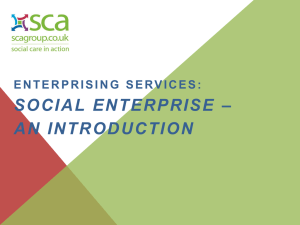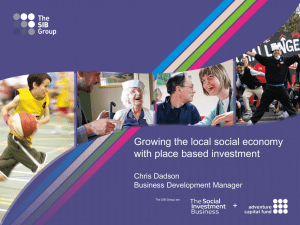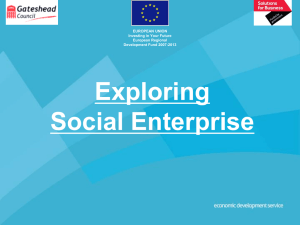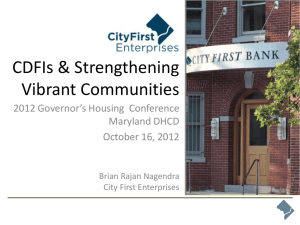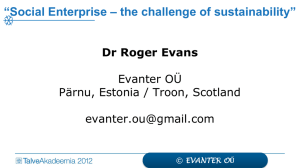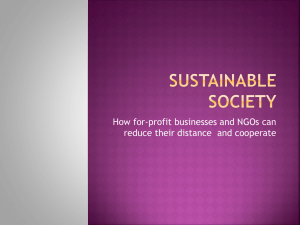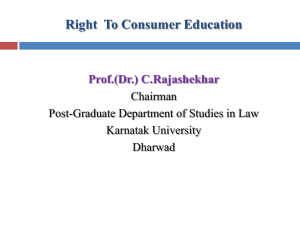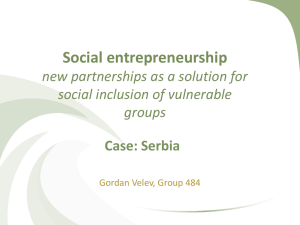MyEducation Seminar: The UK Education System
advertisement
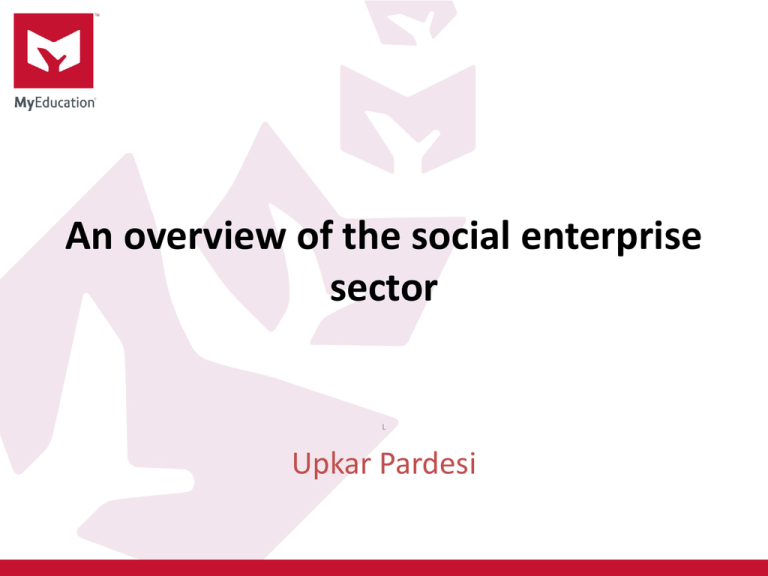
An overview of the social enterprise sector L Upkar Pardesi What is a Social Enterprise? • A social enterprise is a business with primarily social objectives whose surpluses are principally reinvested for that purpose in the business or in the community, rather than being driven by the need to maximise profit for shareholders and owners. The Department for Trade and Industry • Trade for social and/or environmental purposes • Generate at least 50% of their income from trading activity (i.e. selling goods or services) • Largely reinvest their profits back into the business to achieve their social or environmental goals • Have governance and legal structures that enable staff, members, representatives from the local community, or other stakeholders to own and run the business. • Well known examples include The Big Issue, Divine Chocolate and Jamie Oliver’s restaurant chain Fifteen. Types of Social Enterprises Many different types of venture meet SE criteria including: • Worker cooperatives – that provide employment for their members • Consumer cooperatives that provide goods and services for members • Community Businesses – supplying goods and services that meet the needs of a particular local community. • Development Trusts and other community-based regeneration groups • The trading arms of charities • Social Firms – small businesses providing integrated employment and training mainly for people with disabilities • Credit Unions – supplying low cost savings and loans to specific communities • Community Development Finance Institutions providing access to finance for Types of Legal Entities Many different forms of legal entity: • Usually companies limited by guarantee • Registered charities • Industrial and provident societies. • Now include Community Interest Companies (CIC) Statistics on VCOs and Social Enterprises Statistics on VCOs and Social Enterprises: • 22,000 faith based organisations • 11,400 working with women • 11,700 working with BME Groups • 37,000 working with people with disabilities • 200 working with LGBT Groups • 2005-2007 data from the Annual Survey of Small Business UK: – 5% of all businesses – 62,000 Social Enterprises – Contribution £24b to the economy – Employing 800,000 Baseline survey in September 2007 Found • Social enterprises in Birmingham & Solihull employ almost 12,500 staff. • The main service activities provided by social enterprises are: • Training 55% • Counseling /advice services 51% • Education & research 43% • Services for people with disabilities 41% • Health and social care 37% • Youth services 37% Statistics on VCOs and Social Enterprises Statistics on failure rates of small firms including Third Sector Organisations • One Third of all start-ups fail in the 1st year. • Two Thirds fail within three years. Statistics on VCOs and Social Enterprises Statistics on recent deregistration of Charities: • Year end Aug 2010: 3,262* • Year end Aug 2009: 2392 • Year end Aug 2008: 1,630 *Charities with turnover of >£5,000 Source: Charities Commission Sustainability: Reasons Why So Many Charities and VCOs Fail? • Service or Funding Lead: No real knowledge of what the community needs or wants. • “ME TOO” or “COPY CAT” For same or similar communities and causes – Little or no differentiation. (we want one too!!) • Little or no business planning or skills for long term planning. No business development/fund raising skills – rely on consultants to prepare bids. • Become heavily reliant on funding and handouts – no real marketing and business development skills to build sustainability. Sustainability: Reasons Why So Many Charities and VCOs Fail? • Lack of leadership and good governance from the Board. Active volunteers become Trustees – not because of their skills and independent views and judgement. Lack of representation of young and women. • Lack of strong leadership and management skills in the team. Volunteers take up senior officer/CEO/Director role(s) • Closed shop – volunteers get paid jobs without having the right skills. • Undercapitalised – lack of investment. No real business model. Why faith inspired Social Enterprises Fail? • Many BME faith organisations are dominated by older men who may or may not be fluent in English. • Many become Trustees because they are founders of the places of worship/community organisations. • Many continue to employ “priests” and other faith leaders/specialists from overseas and therefore not able to fully engage with British born young people and women. • Many places of worship also create faith inspired community centres, voluntary associations and associated charities that are governed by Trustees selected from congregations – but again tend to be dominated by older men who are not fluent in English language, culture and wider society. • CEO/MD/Senior Officers tend to be appointed from within the same faith community – tend to be men and not always with high level skills of leadership/management Development of Sustainable Social Enterprises Success Criteria: • Strong Board with diverse skills set and knowledge of good Governance and led by committed and well connected Chair. • Access to potential new Trustees/Non-Executive Directors. • Strong CEO/MD/Senior Executive Director with strong leadership skills. • Small team of capable functional managers. • Medium to long-term strategic plan and planning processes in place. • Marketing orientation and a diverse income/customer base: Marketing and fund raising capability is in place. • Access to investment funding. • Well developed partnerships in place. Government Position on SE Sector Growing the Social Investment Market: A vision and strategy Feb 2011 Government Position on SE Sector Growing the Social Investment Market: A vision and strategy Feb 2011 Government Position on SE Sector Growing the Social Investment Market: A vision and strategy Feb 2011 Opportunities • Proposed creation of The Big Society Bank • Emergence of Local Enterprise Partnerships (LEPs) with the £1.4b Regional Growth Fund. • The fund will provide focused investment for projects that offer significant potential for private sector-led economic growth and sustainable employment. • Government includes social enterprise within its definition of ‘private sector’. • Biggest opportunities are in the Health, social care, education, training and youth sectors. Funding Opportunities – • SEIF Capital Growth Fund For SEs to help them to deliver innovative health and social care services, enable them to grow, and become more sustainable. Open till March 2012. Grants and loans from £50K to £150K. • Social Action Fund – Social action in the community – projects that will encourage people to come together in their neighbourhoods to support each other. – Social action inspired by the Olympics and Paralympics – Social action for all ages – projects that motivate people across all generations to get involved in volunteering and charitable giving- For scaling up a successful project – From £500K to £1m • The Capital Adventure Fund – for community enterprises • Community Builder Fund – Look for the 6 best projects The minimum investment is £250,000 and the maximum is £750,000. Closing date 9 December 2011
